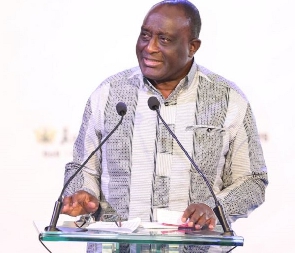 Minister for Trade and Industry, Alan Kyerematen
Minister for Trade and Industry, Alan Kyerematen
Minister of Trade and Industry, Alan Kyerematen, has said the introduction of tax stamps policy on textiles in the country seeks to boost local production and offer buyers the confidence and assurance of making genuine purchases. According to him, the tax policy which is not expected to rake in revenue seeks to ensure that smuggled African textile prints which intend to make locally produced ones uncompetitive are reduced on the market along with the right duties paid. Speaking at the launch of the Textiles Tax Stamp Policy in Accra, Alan Kyerematen highlighted other policy measures aimed at strengthening and sustaining the textile sector to create jobs. “The introduction of a new import regime and restrictions management for textiles is to ensure that entry of pirated designs are restricted. Let me assure you that this measure is not in any way meant to unduly restrain imports,” he said. “We currently do not have the local manufacturing capacity to meet the total national demand of over 120 million yards per annum out of which 35% is produced locally." "The system for acquiring textiles tax stamps has been developed with the help of the Intellectual Property Office to ensure that legitimate textiles are traded on the local market,” Alan Kyerematen explained. He said that in the coming months, the introduction of designated entry corridors will be adopted to ensure that imported African prints adhere to necessary standards. “By this, all imported textiles would be required to enter the country through dedicated corridors; Tema and Aflao which have been fitted with affixing facilities and other needed equipment to keep track and ensure that imported African prints adhere to standards,” he said. The Minister said engagements with local manufacturers will be held as part of efforts to reduce inefficiencies, enhance low cost of production and improve competitive pricing of wax prints. “Currently, local manufacturers benefit from zero-rate VAT granted in January 2019 which has been extended to December 2023. " "To also ensure Ghana can attract foreign textile manufacturers to set up or relocate their plants in Ghana, government will continue to create the necessary environment and engagements to encourage foreign firms including textile manufacturers,” the trade minister said. Meanwhile, the tax stamps policy is expected to commence on November 1, 2022, with enforcement for compliance starting from March 1, 2023. The implementation modalities will include having textiles stamps affixed on all textile prints traded in Ghana. Subsequently, the operation of the textiles task force will be reviewed to ensure that stakeholder membership on the Task Force is adequately representative. The task force is expected to undertake monitoring exercises on all markets after the inception of the effective enforcement date which is scheduled for March 1, 2023. The Textile Tax Stamps Policy is in collaboration with the Ministry of Finance, Ghana Revenue Authority (GRA), the Intellectual Property Office and the Ghana Standards Authority which form part of the key implementing agencies. MA/ESA
Minister of Trade and Industry, Alan Kyerematen, has said the introduction of tax stamps policy on textiles in the country seeks to boost local production and offer buyers the confidence and assurance of making genuine purchases. According to him, the tax policy which is not expected to rake in revenue seeks to ensure that smuggled African textile prints which intend to make locally produced ones uncompetitive are reduced on the market along with the right duties paid. Speaking at the launch of the Textiles Tax Stamp Policy in Accra, Alan Kyerematen highlighted other policy measures aimed at strengthening and sustaining the textile sector to create jobs. “The introduction of a new import regime and restrictions management for textiles is to ensure that entry of pirated designs are restricted. Let me assure you that this measure is not in any way meant to unduly restrain imports,” he said. “We currently do not have the local manufacturing capacity to meet the total national demand of over 120 million yards per annum out of which 35% is produced locally." "The system for acquiring textiles tax stamps has been developed with the help of the Intellectual Property Office to ensure that legitimate textiles are traded on the local market,” Alan Kyerematen explained. He said that in the coming months, the introduction of designated entry corridors will be adopted to ensure that imported African prints adhere to necessary standards. “By this, all imported textiles would be required to enter the country through dedicated corridors; Tema and Aflao which have been fitted with affixing facilities and other needed equipment to keep track and ensure that imported African prints adhere to standards,” he said. The Minister said engagements with local manufacturers will be held as part of efforts to reduce inefficiencies, enhance low cost of production and improve competitive pricing of wax prints. “Currently, local manufacturers benefit from zero-rate VAT granted in January 2019 which has been extended to December 2023. " "To also ensure Ghana can attract foreign textile manufacturers to set up or relocate their plants in Ghana, government will continue to create the necessary environment and engagements to encourage foreign firms including textile manufacturers,” the trade minister said. Meanwhile, the tax stamps policy is expected to commence on November 1, 2022, with enforcement for compliance starting from March 1, 2023. The implementation modalities will include having textiles stamps affixed on all textile prints traded in Ghana. Subsequently, the operation of the textiles task force will be reviewed to ensure that stakeholder membership on the Task Force is adequately representative. The task force is expected to undertake monitoring exercises on all markets after the inception of the effective enforcement date which is scheduled for March 1, 2023. The Textile Tax Stamps Policy is in collaboration with the Ministry of Finance, Ghana Revenue Authority (GRA), the Intellectual Property Office and the Ghana Standards Authority which form part of the key implementing agencies. MA/ESA